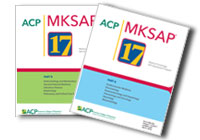 MKSAP has been trusted by internists since 1967 as the best resource for updating knowledge. MKSAP 17, available in Complete, Digital, and Print packages, consists of 11 comprehensive text chapters with related multiple-choice questions. You'll find 1,200 completely new questions to help you identify learning gaps, stay current, and gain the knowledge you need to provide the best possible patient care. MKSAP 17's original and high-quality questions evolve out of case studies and patient scenarios based on the latest evidence.
MKSAP has been trusted by internists since 1967 as the best resource for updating knowledge. MKSAP 17, available in Complete, Digital, and Print packages, consists of 11 comprehensive text chapters with related multiple-choice questions. You'll find 1,200 completely new questions to help you identify learning gaps, stay current, and gain the knowledge you need to provide the best possible patient care. MKSAP 17's original and high-quality questions evolve out of case studies and patient scenarios based on the latest evidence.
For more information on MKSAP 17, or to order your copy, visit mksap17.acponline.org.
MKSAP 17 Q & A
A 64-year-old woman is evaluated for difficulty controlling her urine. The patient works and maintains a very active lifestyle; the urinary leakage is restricting her activities. She needs to wear pads because of involuntary loss of urine with coughing, sneezing, and laughing, and occasionally with physical exertion. There is no dysuria or increased urinary frequency. She does not smoke and does not drink alcoholic beverages. Medical history is remarkable for hypertension, and her only medication is lisinopril.
On physical examination, temperature is normal, blood pressure is 130/78 mm Hg, pulse rate is 72/min, and respiration rate is 14/min; BMI is 29. General examination is unremarkable. Pelvic examination is normal except for mild anterior wall prolapse.
Urinalysis is normal.
In addition to suggesting weight loss, which of the following is the most appropriate management?
A: Oxybutynin
B: Pelvic floor muscle training
C: Postvoid residual urine volume measurement
D: Prompted voiding
E: Urodynamic study

